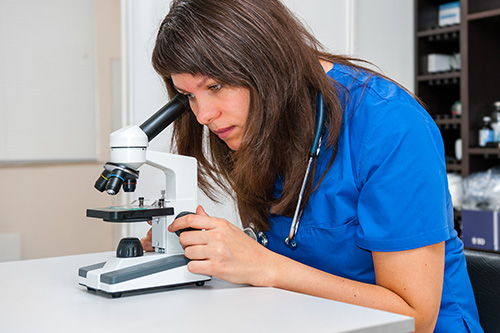Fountain City Animal Hospital has a fully equipped in-house laboratory where we are able to run so many valuable tests to help us keep your precious pets healthy. We routinely check fecal samples for a host of internal parasites including the common worms and protozoan parasites that are not eliminated by any of the monthly heart worm prevention products. We are equipped to check your cat for the two common and potentially deadly retroviruses, feline leukemia virus (FeLv) and feline immunosuppressive virus (FIV). The test we run for heart worms on dogs also checks for three tick-borne diseases which we are sadly beginning to see with more frequency. We routinely run complete blood counts, chemistry panels, and urinalyses on our sick and geriatric patients. These same tests are used as pre-anesthetic screening along with tests for normal clotting function. We run specific tests when we suspect pancreatitis, as well as tests to check your pet’s thyroid and cortisol levels. We identify the type of bacteria or yeast that may be infecting your pet’s ears by examining samples of cells from their ears under the microscope. We monitor your pet’s liver and kidneys when they are on long term medications that could have a negative effect on those organs.
Laboratory

In addition to all this that goes on in our own in-house lab, there are times it is important to send samples outside our hospital. We use board-certified pathologists to examine cytology samples we collect via fine needle aspirate; we use Texas A&M’s world renowned G.I. lab to help us identify a variety of gastrointestinal disorders; and we use many of the labs at the University of Tennessee College of Veterinary Medicine.
Your pets benefit from our doctors’ knowledge and experience in knowing what tests to order when, as well as their ability to interpret sometimes subtle laboratory findings; and they benefit from our licensed veterinary technicians’ ability to collect, handle, and identify various abnormalities with accuracy.
Most importantly, we handle every pet from whom we need to gather blood or urine samples as if they were our own. They are always handled with kindness, gentle quiet reassuring voices, and with only as much restraint as is absolutely necessary to ensure safety for them and our staff.

